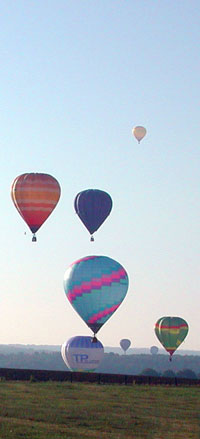|
| 17/08/2015
|
Back to News |
| Bird Flu - Restrictions lifted at Lancashire farm. |
|
DEFRA declared all restrictions revoked, effective 16th August 2015
|
A case of highly pathogenic H7N7 avian flu was confirmed at an egg laying farm near Preston, in Lancashire, on 13th July 2015.
A temporary control zone imposed on Friday at the affected farm has now been replaced by a 10 kilometre surveillance zone and an inner 3km protection zone. Humane culling of all birds at the farm, 170,000 according to reports, is continuing.
While Defra has not named the farm, which is understood to keep poultry indoors and outdoors, the map of the temporary control zone put in place around the farm shows it is based in the Longridge area, near Preston.
Suspicions were first raised after birds on the farm showed clinical symptoms of the disease. These suspicions were reinforced by provisional test results at the end of last week and the presence of the highly pathogenic strain of H7N7 was confirmed on Monday morning.
The restrictions mean poultry farms within the 10 kilometre control zone around the infected premises are not allowed to move poultry, captive birds or other mammals except under licence.
There are also restrictions on the movement of eggs, carcasses, litter, poultry manure and slurry from farms within the control zones, as well as additional record-keeping requirements.
It is not expected that licences will be issued for several days until the Animal and Plant Health Agency (APHA) are confident that they have contained the disease, according to the NFU. Release of game birds within the 10 kilometre zone is strictly forbidden until the restriction has been lifted.
More details of the restrictions in the 10k control zone can be seen here and a useful summary, including how to obtain licences, can be seen here
HIGHLY PATHOGENIC
Confirmation of the highly pathogenic strain will be a concern as far as the poultry industry is concerned. However, the risk to the public from the H7N7 strain is described by Public Health England as 'very low'.
Defra said an investigation into this case, including how the birds became affected was ongoing.
Chief Veterinary Officer Nigel Gibbens said: “Final tests results have confirmed a case of avian flu at a farm in Lancashire. Restrictions put in place last week will continue and the humane culling of all birds at the site is progressing. These actions are part of our tried and tested approach to dealing with previous outbreaks.
"Public Health England has confirmed that the risk to public health from this strain is very low. The Food Standards Agency has said there is no food safety risk for consumers.
“Bird keepers should remain alert for any signs of disease, report suspect disease to their nearest APHA office immediately and ensure they are maintaining good biosecurity on their premises,” Mr Gibbens said.
He said Defra had a strong track record of controlling and eliminating previous outbreaks of avian flu in the UK. Outbreaks in Yorkshire last year and Hampshire in February were both successfully contained, allowing restrictions to be lifted at the earliest opportunity.
Anyone suspecting avian flu (bird flu) should contact their nearest APHA office immediately.
REACTION
The NFU said its regional office had made contact with the farm to offer support and advice.
NFU chief poultry adviser Gary Ford said: "Farmers take biosecurity very seriously, and the NFU is working very closely with the member involved."
Prof Andrew Easton, Professor of Virology, University of Warwick, said confirmation of the case was a concern 'because of the potential threat to the UK poultry industry'.
"There is no reason at this stage to believe that there is a threat to humans either directly by infection with the virus or indirectly by the presence of the virus in food," he said.
"Bird flu in poultry is categorised as being of either low or high risk of disease in domestic birds such as chickens and it is the latter category that is the most concerning."
Dr Colin Butter, Head of Avian Viral Immunology, The Pirbright Institute, said the H7N7 strainfound in Lancashire Poultry farm was highly pathogenic in chickens.
“Although bird flu does not readily spread from person to person there has been a limited direct infection of people, particularly with the Highly Pathogenic H5N1 and the Low Pathogenic H7N9 strains.
Whilst both of these viruses may cause severe disease or death in people the outcome of infection with other strains, including H7N7, is usually mild symptoms, often limited to conjunctivitis (a local infection of a membrane of the eye)."
Dr Derek Gatherer, Lecturer in Bioinformatics, Lancaster University, said the USA suffered its worst avian influenza outbreak this spring with several million birds being slaughtered in the state of Iowa and other parts of the Midwest in an outbreak caused by the highly pathogenic H5N2 subtype.
Europe has been much luckier, he said. Although the UK has had three identified bird flu outbreaks in the last 12 months, none have been H5N2.
"We did see the relatively new and pathogenic H5N8 appear last year, which had previously been seen in the Netherlands, but the other two outbreaks have been H7N7 which is less of a concern."
“Nevertheless, it is all bad news for the farmers who will lose their stock and the neighbouring farmers whose businesses will also be severely affected during the restricted movement period."
“The main concern for the British government will be making sure that the UK and Europe in general, doesn’t suffer the kind of disastrous impact on our poultry industry that the Americans have suffered. The way to ensure that is stringent and immediate quarantine and culling.” |
| |
|
|

|



